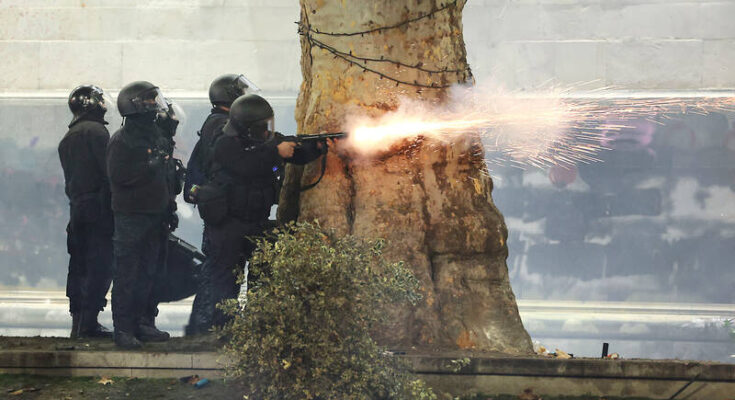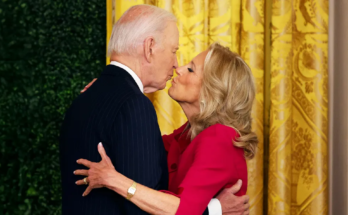AFP, TBILISI
Georgian police on Monday fired tear gas to try to disperse thousands of pro-EU demonstrators rallying in the center of Tbilisi amid a deepening political crisis in the Black Sea nation.
Georgian Prime Minister Irakli Kobakhidze hours earlier had vowed “no negotiations” with the opposition, enraged by the ruling Georgian Dream party’s decision to shelve EU accession talks after it claimed victory in an election decried as fraudulent.
The nation of about 3.7 million has been rocked by turmoil since the Oct. 26 parliamentary elections, with Georgian Dream facing accusations of betraying the nation’s long-standing ambition of joining the EU and of moving Tbilisi closer to Moscow.

Police fire tear gas toward protesters during demonstrations against the Georgian government’s postponement of EU accession talks in central Tbilisi yesterday.
Photo: AFP
Opposition lawmakers are boycotting the parliament and the pro-EU president is seeking to throw out the election results in the constitutional court.
Kobakhidze refused any potential negotiations with the opposition, as Monday marked five consecutive nights of clashes between protesters and riot police outside the parliament in central Tbilisi.
Thousands of demonstrators, waving Georgian and EU flags and shouting “Georgia,” were on the streets again, including in the second city of Batumi, to protest the government’s decision to suspend EU accession talks.
Police quickly moved in to move the crowds away from the parliament, which has been targeted by the protesters.
As the crowds regathered away from parliament, authorities fired tear gas at protesters, some of whom launched fireworks at the police into the early hours of yesterday.
Kobakhidze on Monday claimed that the protests were “funded from abroad” and vowed “there will be no revolution in Georgia.”
He also lambasted Western nations for failing to condemn “organized violence” by protesters, as they have criticized excessive force by Georgian police.
Those on the streets of Tbilisi said they were just as defiant about not backing down.
“We don’t care about their orders, they are breaking the law every day,” Giorgi, 35, said. “We have to stand here and protest against this dictatorship that is coming.”
Rights groups and pro-EU Georgian President Salome Zurabishvili have slammed the police’s forceful crackdown over the past week.
Zurabishvili, who backs what she calls a “resistance movement” against Georgian Dream, on Monday said that those detained by police “have been subjected to systematic beatings.”
The “majority of the arrested protesters have injuries to their heads and faces, broken face bones, eye sockets, open wounds,” she said.
Authorities are accusing the protesters of turning violent and endangering public safety.
Dozens have been injured in the protests since Thursday last week, including demonstrators, police and journalists, according to officials and activists, although the exact numbers were unclear.
Some protesters have launched fireworks toward police, started fires and thrown projectiles, while police have been seen charging into and forcibly detaining protesters.
Authorities have also deployed water cannon, tear gas and rubber bullets against the crowds. More than 200 were detained during the first four nights of protest, the Georgian Ministry of Internal Affairs said.
Tbilisi has seen numerous bouts of protest over the past two years, as the Georgian Dream party has pushed through legislation targeting civil society, independent media and the LGBTQ+ community.
Brussels has warned those policies are incompatible with membership of the bloc.
Georgia’s constitution commits the nation to seeking membership of the EU, and opinion polls have regularly shown that 80 percent of the public are in favor.
Russia on Monday defended Georgia’s crackdown on protesters.
Kremlin spokesman Dmitry Peskov said that Tbilisi is acting to “stabilize” the situation, accusing protesters of wanting to “stir up” unrest.
He also drew a “direct parallel” with Ukraine’s 2014 “Maidan” protest, which ousted a Kremlin-backed leader who reneged on an EU partnership agreement.



